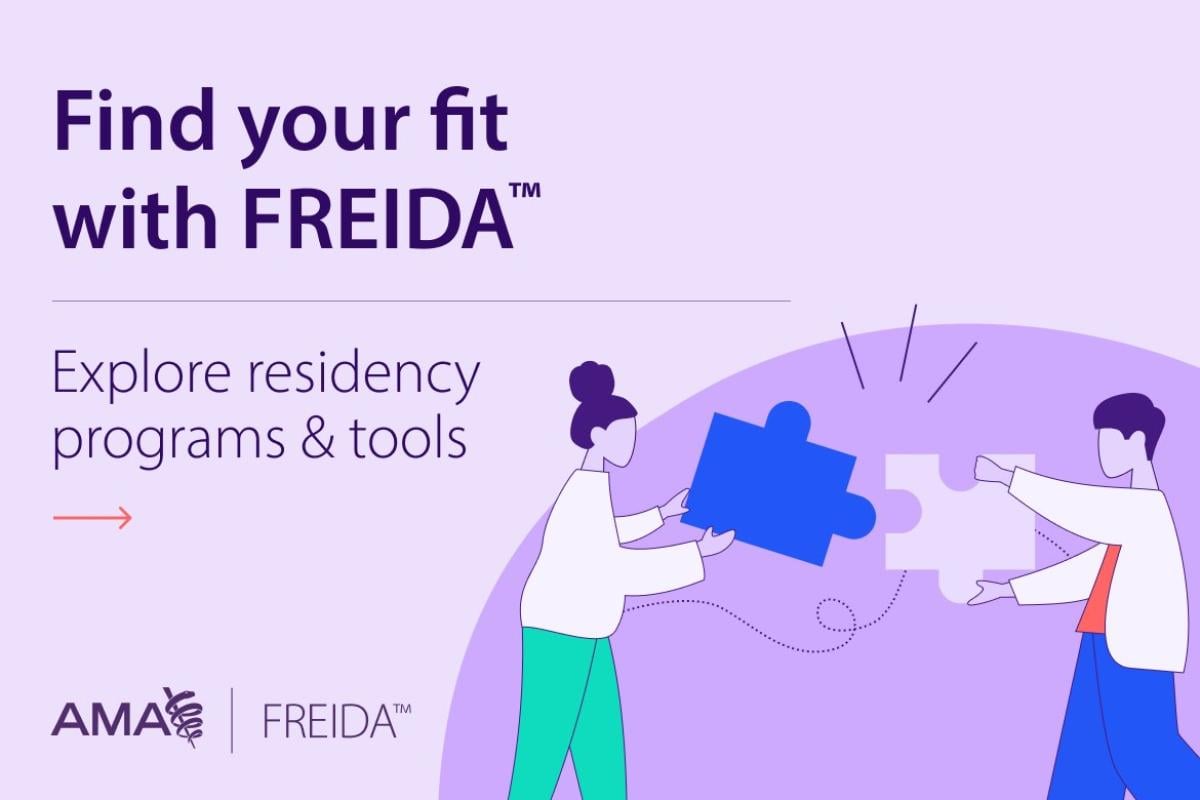- What kind of research do med schools look for?
- Do you have to do research as a med student?
- What percent of medical students do research?
- Why do medical students do research?
- How can I get involved in medical research?
- How can I find medical research opportunities?
- How do I get ideas for medical research?
- Can med students get paid for research?
- How do I get a research paper published as a student?
- What counts as research for residency applications?
- How the AMA can help
Conducting research in medical school can be very rewarding. It's also a great way to stand out to residency programs ahead of the Match season. The question for many medical students, however, is where to start.
The AMA has the answers to frequently asked questions on medical school research and how you can begin pursuing these opportunities.
What kind of research do med schools look for?
While many students enter medical school with some research experience, it’s not required. Additionally, previous work in the lab may not be the type of research you want to engage in once you start medical school.
Critical thinking is a part of the field of medicine, and for prospective medical students it can play a key role in a strong medical school application. One method to sharpen your analysis skills is to participate in research opportunities for premed students as either an undergraduate or during the time between college and medical school.
Do you have to do research as a med student?
While research has always been a key component of medical education, research requirements will vary depending on the medical school and curriculum as well as your goals.
What percent of medical students do research?
According to a 2020 study, the percentage of graduating medical students who report research activity has increased in recent years, with more than 80% of students reporting participating in a research project with a faculty member.
Why do medical students do research?
Pursuing research during medical school is one way that medical students can explore scholarly interests, grow their scientific knowledge base and stand out to physician residency programs when the time comes. A rich research experience also helps medical students develop valuable skills useful to practicing medicine, such as critical thinking and teamwork.
In addition, it is valuable to include research projects on your CV and Electronic Residency Application Service (ERAS) application. On your CV, research should be highlighted under a “Research Experience” section or under the header “Publications, Presentations, and Abstracts”:
- Use reverse-chronological order (most recent first).
- Be clear, accurate and concise.
- Highlight your contributions and any outcomes (publications, presentations, awards).
On your ERAS application, you can include your research experience in the following sections:
- Experience section: Select "Research" as the experience type when adding a new entry. Describe your research position, responsibilities, duration and key outcomes or achievements.
- Publications section: If your research led to presentations, abstracts, posters or published papers, list these specifically under the Publications section of ERAS.
- Personal statement (optional): You may briefly discuss your research experience and its impact on your career in your personal statement, but this is supplementary to the formal sections.
How can I get involved in medical research?
If you don’t have prior research experience, don’t worry—undergraduate research varies in depth and focus. Many medical schools offer the opportunity for research fellowships between the first and second year of training. You can find other opportunities through clinical research internships and summer research programs for medical students. Learn more about getting started with research in medical school.
How can I find medical research opportunities?
Medical student research can take on many forms. While more traditional research can take place in a laboratory, research experiences can be found in areas such as public health, policy, technology and more. Identifying the right research area can be challenging, which is where mentors become invaluable guides as you begin your research journey.
When it comes to building research credentials, it's wise to start small. Once you're comfortable, consider joining an existing research project or taking on roles with limited involvement, such as data analysis or literature review. You can further expand your participation by actively seeking out experienced mentors or joining research-focused student organizations.
You might also be interested in exploring conferences or events where you may find opportunities to eventually showcase your hard work through a poster presentation or in a virtual setting.
How do I get ideas for medical research?
The first spark of inspiration can transform an idea into a project worth sharing. Determine where your interests lie and follow your passions to help you identify the right areas of research for you. It could be related to a specialty, a specific disease or condition you're curious about, or a health issue affecting the community. Conferences and events, such as the AMA Research Challenge and AMA Poster Showcase, may also be ways to explore emerging topics.
Can med students get paid for research?
Research funding opportunities may be available through institutional or external research fellowships, grants and programs. Medical schools may also offer funding to offset research expenses.
External research-focused events may provide another opportunity for funding. The AMA Research Challenge, for instance, offers the opportunity to showcase scholarly pursuits while competing for a $10,000 grand prize. Find a few key takeaways on winning research projects in past years and tips for crafting a standout poster.
How do I get a research paper published as a student?
If you get to the point where your research is complete enough to withstand the rigors of medical journal peer review, you may consider creating a manuscript for publication. Keep in mind that the publishing research as a medical student is a lofty goal that requires a novel question, dedication to details and compelling findings.
To get traction for potential publication, focus on literature review to understand what has been researched and examine how your research potentially can advance the topic. From there you can attend to the details involved with writing a strong, well-articulated abstract, having a clear theme and making thorough revisions before you submit.
When researching where to publish, consider journals that accept submissions from physicians in training and are accessible for newcomers in publishing. Alternatively, you might also be interested in expressing your views through opinion writing and potentially getting that viewpoint published.
What counts as research for residency applications?
Research experiences may include abstracts, poster presentations, publications, scholarly projects, academic presentations and more. The significance of research varies across specialties and often is just one of several factors considered during the selection process. If research is a genuine passion and you have tangible results to show for your efforts, it’s worthwhile to highlight these accomplishments in your residency application.
How the AMA can help
Whether success means strengthening your leadership skills so your CV stands out or completing cutting-edge research while prepping for residency—the AMA has resources to help you succeed in medical school.
AMA Research Challenge
The AMA Research Challenge is the largest national, multi-specialty conference for medical students, residents and fellows, and international medical graduates to showcase and present research. This virtual research event provides participants the opportunity to gain recognition, boost their CV and advance their research.
Abstracts are considered in various topics across six categories:
- Basic science
- Clinical and translational research
- Clinical vignettes
- Health systems science
- Medical education
- Public health and health policy
AMA Poster Showcase
Present in-person—the AMA Poster Showcase highlights a range of research from medical students, residents and IMGS across 12 categories. Held in conjunction with AMA’s Annual and Interim Meetings, the showcase offers participants a national platform to share their work, connect with peers and engage with physician leaders.
AMA Research Education series
If you are looking to boost your medical student research skills, check out the AMA Research Education Series available on the AMA Ed Hub™. Modules include:
- “Conducting Research That Advances Health Equity”: Explore strategies such as community engagement, appropriate use of race in research and securing support for projects that address health disparities.
- “Designing and Delivering Impactful Virtual Research Posters”: Access a road map on how to engage your audience as a presenter to help medical students stand out in a virtual setting.
- “Initiating the Medical Research Journey”: Find practical strategies for getting started, from finding mentors and defining research questions to navigating institutional resources that support medical student research.
- “Navigating the Medical Research Publishing Process”: Expert cover topics such as selecting journals, responding to reviewer feedback and overcoming common challenges like publishing without a mentor.
- “Planning for a Career in Academic Medicine”: Find guidance on balancing professional roles, securing grants and building a path toward leadership and scholarly impact.



